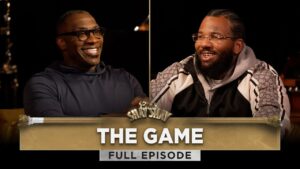Conor Oberst’s music has long been celebrated for its dynamic, intelligent, and often biting quality. With an extensive catalog spanning from the early ’90s to the present day, the Omaha native has carved out a distinctive space in the indie rock world, whether through his work with Bright Eyes, Desaparecidos, or his solo material. Known for his collaborations with artists like Phoebe Bridgers and his contributions to projects like Monsters of Folk, Oberst’s career has been a journey of artistic evolution.
In a recent Broken Record conversation with Justin Richmond, Oberst took a deep dive into his musical journey, his Omaha roots, and the evolution of indie music.
Oberst’s career began at an early age, recording his first album with Commander Venus when he was just 14 years old. Growing up in Omaha, Nebraska, Oberst was immersed in a thriving DIY music scene alongside bands like Cursive and The Faint. With mutual support from fellow musicians, the Omaha scene was characterized by its tight-knit, independent spirit.
“My first memories of making music were with friends in the community. We were all figuring it out together,” Oberst recalled. This DIY ethos laid the groundwork for Oberst’s career and was pivotal in building the foundation for the Saddle Creek record label, which he co-founded with friends. Saddle Creek would become a hub for the Omaha music scene, eventually gaining national attention and providing a platform for Oberst’s early work with Bright Eyes.
Oberst’s early success came through independent labels, notably Grass Records, before helping to establish Saddle Creek Records. His 2005 album “I’m Wide Awake, It’s Morning” marked a commercial peak for Oberst, earning him widespread acclaim and comparisons to Bob Dylan. The media attention that followed propelled Oberst and Bright Eyes into the mainstream, though Oberst has always maintained a sense of independence from the commercial pressures of the music industry.
Reflecting on the success of “Wide Awake” and its companion album “Digital Ash in a Digital Urn”, Oberst admitted he was never interested in achieving massive commercial success, but instead focused on creating meaningful music. “It was surreal to see the albums hit big, but I always thought the music would resonate, regardless of where it ended up,” Oberst shared.
In the interview, Oberst also shared insight into his creative process, explaining how he approaches songwriting. He explained that he doesn’t write well during emotionally intense periods, preferring to step back and write from a more objective perspective after some time has passed. His latest record, a collaboration with Alex Obert, marks a departure from the Bright Eyes approach, showcasing a more mature and reflective sound.
“I’m always trying to evolve,” Oberst said. “This new record is more about the sound than the words. It’s a reflection of where I’m at now, after all these years.”
Now 44, Oberst has plenty of perspective on his career. He acknowledges the surreal nature of his success and the responsibility that came with it. As his shows grew larger, so did his awareness of how his music impacted others. This realization, while grounding, also led to a loss of innocence in the business side of things, as the pressures of success began to mount.
Despite these challenges, Oberst remains grateful for the longevity of his career. “I’m lucky to still be able to create and perform. There are moments where I can’t believe I’m still doing this,” Oberst reflected. “But I never set out to achieve stardom. I just wanted to make music.”
Oberst also shared stories about his upbringing in a musical household, with a father who played semi-professional music in wedding bands. While his mother wasn’t a musician, Oberst recalled how music was always present in the home, influencing his early exposure to the art form.
His father, who later transitioned into managing Oberst’s career, became more deeply involved in the music world, helping to navigate the complexities of Oberst’s rising fame. Oberst expressed pride in his father’s decision to leave his corporate job at Mutual of Omaha and join the music scene, further strengthening their family bond.
Oberst’s career has also been marked by moments of political activism, notably in response to the political climate during George W. Bush’s re-election. His song “When the President Talks to God,” written in protest of the war in Iraq, became an anthem for disillusioned youth. Oberst performed the song during a press tour for Wide Awake and Digital Ash, even having a memorable conversation about it with Jay Leno.
The discussion also turned to Oberst’s involvement in the Vote for Change tour, a political movement to rally support against the Iraq War, which featured artists like Bruce Springsteen and Pearl Jam. Oberst recounted how Springsteen was welcoming and gracious, even introducing Oberst’s band before their performances.
Oberst also shared a touching personal story from his tour with Springsteen, recalling a moment where he got to sing with Springsteen onstage in Omaha—an unforgettable experience for both Oberst and his father.
As Oberst reflects on his career, he also acknowledges the loss of musical icons such as Neil Young and John Prine. These figures have had a profound influence on Oberst and many others in the music world, shaping the trajectory of their careers and the broader music industry.






